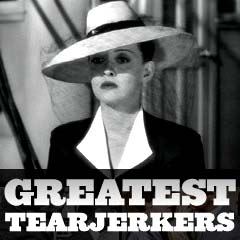|
The Greatest Tearjerkers of All-Time
|
|
Title Screen
|
Movie Title/Year and Brief Tearjerker Scene Description
|
Screenshots
|

|
Paper Moon (1973)
- the final tearjerking scene of young and precocious,
orphaned 9 year-old Addie (Tatum O'Neal) being dropped off at her
relative Aunt Billie's (Rose-Mary Rumbley) place, and how she deliverately
left her 'father' Moses Pray (Ryan O'Neal) a picture of herself
in his car - of her sitting on a 'paper moon' taken at a carnival
- her
objective was to be reunited again with him on the road
- shortly later in the film's conclusion, the scene
of their reunion -- Addie ran away from her Aunt's place, so that
she could continue swindling and grifting with Moses on the road;
she ran after him with her bag and found him only a short way down
the road (he had paused and had second thoughts after he had found
her 'paper moon' picture)
- at first, however, he told her: "I
don't want you ridin' with me no more" - she firmly disagreed
and retorted: "You still owe me $200!" - and although
he was outraged with her, they both found themselves jumping onto
his dilapidated, brakeless Model T farm
truck that began rolling away
|
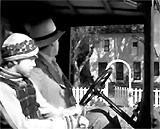
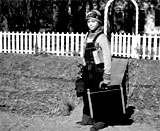
Addie Dropped Off at Aunt Billie's Place
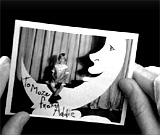
Sitting on 'Paper Moon'
|
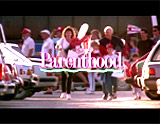
|
Parenthood (1989)
 #49 #49
- the flashback memory (at age 35) in the film's opening
in which emotionally-scarred young Gil Buckman (Max Elliott Slade
as youth) relived his cold, detached and distant father Frank (Jason
Robards) abandoning him at a baseball game on his birthday, leaving
an usher named Stan to watch over him until the 9th inning; when
the usher asked: "Dad bring you here a lot?", Gil responded why
he was alone: "Once a year on my birthday.
Then he pays an usher to watch me....You have to understand, my
father in his own childhood was without a positive male influence"
- Gil then told about his father's damaging upbringing:
("His own
father kicked him out when he was 15, so my dad was taught to see
child-raising as a job, a burden, a prison rather than a playground")
- the much-later scene
between Gil (Steve Martin as adult) (who was questioning his own
abilities as a father) and his father Frank, who asked for advice
about parenthood, referring to both Gil's oldest son Kevin (Jasen
Fisher) with behavioral problems and Gil's brother Larry (Tom Hulce)
who had money problems: (Frank: "I
never should have had four. You know, when you were two years old,
we thought you had polio. You know about that?...Yeah, well, for
a week, we didn't know. l hated you for that....I did. l did. l hated
having to go through that - caring, the worrying, the pain. That's
not for me. And you know, it's not like that all ends when you're
18 or 21 or 41 or 61. lt never, never ends...There is no end-zone.
You never cross the goal line, spike the ball and do your touchdown
dance. Never. l'm 64. Larry's 27. And he's still my son. Like Kevin
is your son. You think l want him to get hurt? He's my son....Hey,
l'm all right. l'll figure it out"); Gil responded: ("Hey.
Who's to say who's the shitty father? Kevin's in therapy. We got
called to school last year because Taylor (Alisan Porter) was kissing
all the boys. Justin keeps ramming things with his head. My career
is in the shithouse");
Frank came up and gently slapped Gil's face: ("You worry too
much. You always did")

Gil Asking His Father Frank For Advice About Parenthood
|
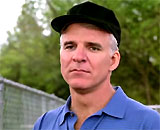
Gil's Response
|
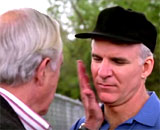
Gil Slapped ("You worry too much. You always did")
|
- the tearjerking exchange between Frank and young
Cool (Alex Burrall) - the 8 year-old illegitimate black son of
Frank's irresponsible "black sheep"
gambling son Larry after the child was deserted; Larry had
fled for Chile to escape deadly bookie-creditors: Cool: ("Is
he ever coming back?"), and Frank's abrupt response: "No!",
but then offered: "Would you like to stay here with us?"
- Grandma's (Helen Shaw) 'roller-coaster' story:
("You know, when l was 19, Grandpa took me on a roller coaster.
Up, down, up, down. Oh, what a ride... l always wanted to go
again. You know, it was just interesting to me that a ride could
make me so, so frightened, so scared, so sick, so excited,
and so thrilled all together. Some didn't like it. They went
on the merry-go-round. That just goes around. Nothing. l like the
roller coaster. You get more out of it")
|
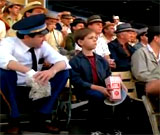
Young Gil Abandoned at Baseball Game by His Father
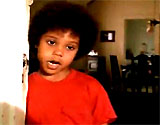
8 year-old 'Cool' - Illegitimate Boy Deserted by Frank's
Irresponsible Son Larry
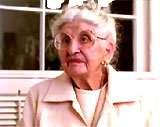
Grandma's (Helen Shaw) 'Roller-Coaster' Story
|

|
Paris, Texas (1984, UK/Fr./W. Germ.)
- the poignant second bravura peep-show scene of an
8 minute long conversation, including Travis' (Harry Dean
Stanton) confession to his estranged wife Jane (Nastassja Kinski):
("I knew these people. These two people. They were in love
with each other. The girl was very young, about 17 or 18, I guess.
And the guy was quite a bit older. He was kind of raggedy and wild.
And she was very beautiful, you know. And together they turned
everything into a kind of adventure. And she liked that....")
- Jane was unable to see him, until she realized that he was describing
their life in his story - their images overlapped or
melted together and then separated, followed by the climactic moment
when she turned off the light in her room so she could view him
and recognize him
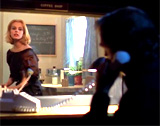
|
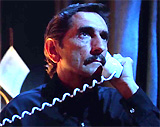
|
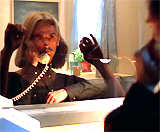
|
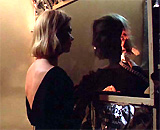
|
|
Travis's Second One-Way Mirror Conversation
With Jane
|
- the heartbreaking conclusion of their talk - estranged
father Travis volunteered to return 7 year-old Hunter (Hunter Carlson)
to Jane in his downtown Houston Meridian Hotel room, #1520 ("He
needs you now, Jane, and he wants to see you...He's waiting for
you"); she picked up her son inside the hotel room, while Travis watched from
afar in the parking lot, and then drove away with tears flowing
down his cheeks; he had earlier stated that he believed Hunter would
be best served by being with his mother ("I know that now. You
belong together with your mother")
|
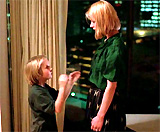
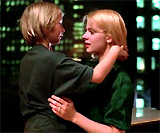
Hunter Reunited with Jane in The Hotel Room
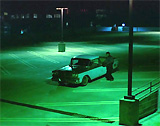
Travis Watching And Driving Off From Parking Lot
|

|
The Passion of the Christ (2004)
 #94 #94
- the agonizing, unsparing crucifixion
death of "Jesus Nazareth/ King of the Jews"
(James Caviezel) on the cross - first severely beaten, forced to
carry part-way his own wooden cross to the hillside of Golgotha outside
Jerusalem, and then was nailed to the cross to suffer and die
|
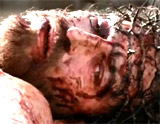
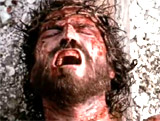
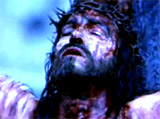
|

|
Paths
of Glory (1957, UK)
- the final tavern scene in which a frightened, fragile,
teary-eyed and innocent captured German blonde girl (Susanne Christian
in the credits, actually Christiane Harlan, director Kubrick's
future third and last wife) was forced
to sing a well-known German ballad for a group of Dax's French
soldiers - a folk song of love in war, called "The Faithful
Soldier," and
the looks on their faces as they first humiliated her, and then
softened, listened empathically and understood her pain; the song
evoked memories of their youth, their homes, and their loves in
a world they might never see again
- in the film's conclusion, Commander Dax (Kirk Douglas)
was outside the tavern, where he was watching and listening impassively;
he received orders from Commander General George Broulard (Adolphe
Menjou) to immediately return his unit to the front's trenches;
to give his men the "short" rest
they were promised but never fully received following the assault
on Ant Hill, Dax replied, with the film's last line: "Well,
give the men a few minutes more, Sergeant"; then, he walked
off as the sound of drums and military music playing the "Soldier
Boy" song rose
in volume and drowned out the sound of the folk song
|
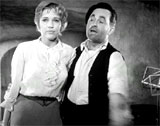
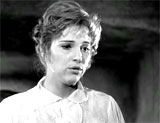
German Girl Singing in Tavern
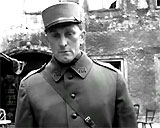
|
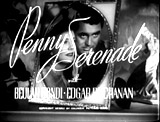
|
Penny Serenade (1941)
- the heart-warming scenes, told in
flashback, of childless parents Roger Adams (Cary Grant) and his wife
Julie (Irene Dunne) who brought home an adopted five week-old baby
girl from an orphanage for a one-year probation period - their nervousness
about keeping quiet and their exhaustion after getting up all night
with it
- the scene before a judge a year later, when Roger
(without an income) movingly begged and pleaded for the official
to grant them a continuation of the adoption, rather than return
the child to the orphanage: ("...We've had her since she was six
weeks old. It just doesn't seem reasonable that we should have to
give her back to, to, to strangers ...Look your Honor, she's not
like an automobile or an icebox or a piece of furniture or something
you buy on time and then when you can't give up the payments they
take it away from you!...Anyone could give up those kinds of things,
but I ask you Judge, how can you give up your own child? And she
is our child just as much as if she'd been born to us!... the first
time I saw her, she looked so little and helpless. I didn't know
babies were so, so little. And then when she took a-hold of my finger
and I held onto it. She, she just sort of walked into my heart Judge
and, and she was there to stay. I didn't know I could feel like that...
It's not only for my wife and me, I'm asking you to let us keep her
Judge, it's for her sake, too. She doesn't know any parents but us.
She wouldn't know what'd happened to her. You see, there's so many
little things about her that nobody would understand her the way
Judy and I do. We love her Judge, please don't take her away from
us. Look, I'm not a big shot now, I-I'll do anything, I'll work for
anybody. I-I'll beg, I'll borrow, I-I'll. Please, Judge, I'll sell
anything I've got until I get going again. And she'll never go hungry,
she'll never be without clothes not so long as I've got two good
hands, so help me!")
- and later, the heart-wrenching scene of the aftermath
for the heartbroken couple following the death of their six-year-old
child Trina after a sudden and brief illness, when the bereaving
Mrs. Adams wrote a letter to the saddened adoption agency's representative
Miss Oliver (Beulah Bondi): ("Since the night of Trina's death,
we have been like strangers to one another. I don't know what to
do. It seems as if there is nothing between us any more. I've tried
to talk to him, but he does not wish to listen. He is punishing himself,
not realizing that he is also punishing me")
- the final scene in which another child, a two-year
old boy, was offered for adoption to the Adams couple, communicated
via a phone call from Miss Oliver: ("He's the exact image of
the youngster you asked for when you first wrote to me. Do you remember?
I have that old letter here in front of me now - 'Curly hair, blue
eyes, dimples'. And this is strictly off the record, but really,
another couple has the right to see him first, but he's such a remarkable
baby that I thought perhaps you and Mr. Adams might take a look").
Julie responded with great anticipation: "Please don't have
that other couple see him until we do!"
|


Adams' Family's Adoption of Baby Girl
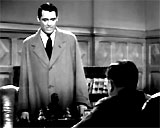
Roger's Plea to Judge to Keep Child
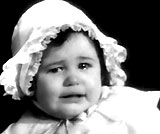
Their Daughter
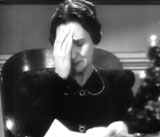
Miss Oliver's Receipt of Letter from Mrs. Adams
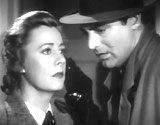
A New Adoption Possibility
|

|
Persepolis (2007, Iran/US/Fr.)
- Marjane Satrapi's dark autobiographical animated film
based on her best-selling graphic novels
- the scene set during the 1979 Islamic revolution (against the US-backed Shah)
in which 11 year-old Marjane (or Marji) Satrapi (voice of Chiara Mastroianni)
visited her imprisoned, soon-to-be executed Uncle Anouche (voice of François Jerosme/Iggy Pop),
an Iranian political prisoner, when he gave her a second swan made of hardened bread crumbs,
calling it "the uncle" of the first swan he gave her from his first time in jail
- the scene of Marjane lying in bed with both swans,
cursing God and imagining the two swans swimming out to sea
- also,
the demise of one of Marjane's friends, Nima, who tried to escape
a raid on a forbidden drinking party and fell to his death trying
to leap from one rooftop to another
- the heartbreaking scene
in which political dissident Marjane left repressive Iran forever
to live in Europe, and saw her Grandmother (voice of Danielle Darrieux/Gena
Rowlands) for the last time: ("That was the last time I saw my grandmother.
She passed away shortly afterwards. Freedom always has a price")
- and the final voice-over by young Marjane of her
memories about how her Grandmother kept smelling fresh: (Marjane: "Grandma, you always smell so nice.
How do you do it?" Grandmother: "Well, I'll tell you.
Every morning, I pick fresh jasmine flowers, and when I get dressed I put them into my brassiere.
That way, I smell nice all day")
- the closing credits featuring falling
jasmine flowers (white flowers on a black background)
|

Marji's Visit With Uncle in Prison
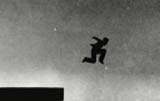
Demise of Marji's Friend Nima
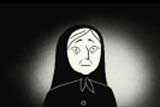
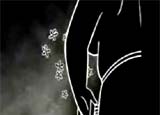
Flowers Flowing Out of Grandmother's Bra
|
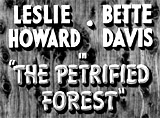
|
The Petrified Forest (1936)
- the death scene at the finale,
as idealistic and disillusioned writer/world traveler Alan Squier
(Leslie Howard) died in the arms of culturally-starved waitress Gabrielle
(Gabby) Maple (Bette Davis) after being shot by ruthless fugitive
gangster Duke Mantee (Humphrey Bogart) in a run-down Arizona desert
cafe. Before slumping in her embrace and dying, he told her: ("You
know, they were right, Gabrielle, the stars I mean. I had to come all
this way to find a reason. The Duke understood what it was I wanted.
I hope you...I hope you..."). When she tried to get him
to continue talking ("What
Alan? What did you say? Alan!"), he was gone
- Gabrielle's realization
that he had found a purpose in his life - his life insurance policy
for $5,000 had been made out in her name - allowing her the freedom
to leave the town. She planned to bury Alan out in the petrified forest,
and then recited the film's final poetic lines, taken from "Ballad
Written For a Bridegroom" (Part VI) by Victorian poet Algernon
Charles Swinburne:
Thus in your field
My seed of harvestry will thrive
For the fruit is like me that I set
God bids me tend it with good husbandry
This is the end for which
We twain are met.
|

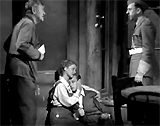
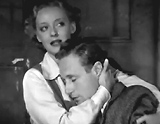
Death of Alan in Gabby's Arms
|

|
Philadelphia (1993)
 #33 #33
 #27
#27
- the moving interpretation by dying, AIDS afflicted ex-lawyer
Andrew Beckett (Tom Hanks) from Philadelphia, wrongly terminated from
his prestigious law firm, to his initially homophobic lawyer Joe Miller
(Denzel Washington) about the music in his favorite Maria Callas aria
- he spoke over the music and pulled his IV around with him as he accepted
his own impending death: ("...The music - it fills with a hope,
and it'll change again, listen. 'I bring sorrow to those who love me.'
Oh, that single cello! 'It was during this sorrow that Love came to
me.' A voice filled with harmony, that said: 'Live still, I am Life!
Heaven is in your eyes. Is everything around you just the blood and
mud? I am divine. I am Oblivion. I am the god that comes down from
the heavens to the Earth and makes of the Earth a Heaven. I am Love!
I am Love!'")
|
Maria Callas' Opera Aria "La Momma Morta"
|

|

|
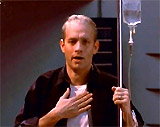
|
- the hospital scene of Beckett
with his long-term male lover Miguel Alvarez (Antonio Banderas) after
first bidding farewell to family and friends (Andrew's supportive
mother Sarah (Joanne Woodward) whispered: "Goodnight,
my angel, my sweet boy"), then alone when he dimmed the lights,
told Miguel: ("Miguel,
I'm ready") and removed his own oxygen mask
- in the final
scene during the reception held in the Beckett home following the funeral,
mourners watched home movies of Andrew's younger days, to the tune
of Neil Young's Philadelphia
|

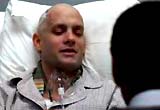

Andy's Removal of Oxygen Mask
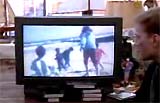
Home Movies During Funeral Reception
|
